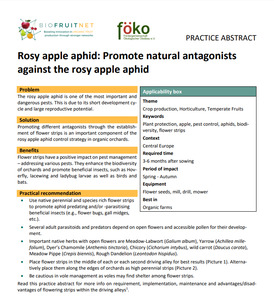{Tool} Rosy apple aphid: Promote natural antagonists against the rosy apple aphid (Biofruitnet Practice Abstract). Creator(s): Adolphi, Christina and Oeser, Niklas. Issuing Organisation(s): FÖKO - Fördergemeinschaft Ökologischer Obstbau. Biofruitnet Practice Abstract, no. 020. (2022)
|
PDF
- Published Version
- English
(Rosy apple aphid: Promote natural antagonists against the rosy apple aphid)
558kB | |
![[thumbnail of 2022-07-01 14_21_54-Rosy apple aphid_ Promote natural antagonists against the rosy apple aphid.png]](/44183/3.hassmallThumbnailVersion/2022-07-01%2014_21_54-Rosy%20apple%20aphid_%20Promote%20natural%20antagonists%20against%20the%20rosy%20apple%20aphid.png)  Preview |
Image (PNG)
- Cover Image
- English
119kB |
|
PDF
- Published Version
- German/Deutsch
(Mehlige Apfelblattlaus: Förderung natürlicher Antagonisten im ökologischen Obstbau)
584kB | |
|
PDF
- Polish/Polski
(Promowanie naturalnych wrogów mszycy jabło- niowo-babkowej w sadzie)
589kB |
Document available online at: https://orgprints.org/44183
Summary in the original language of the document
Flower strips have a positive impact on pest management – addressing various pests. They enhance the biodiversity of orchards and promote beneficial insects, such as Hoverfly, lacewing and ladybug larvae as well as birds and bats.
Practical recommendation
• Use native perennial and species rich flower strips to promote aphid predating and/or -parasitising beneficial insects (e.g., flower bugs, gall midges, etc.).
• Several adult parasitoids and predators depend on open flowers and accessible pollen for their development.
• Important native herbs with open flowers are Meadow-Labwort (Galium album), Yarrow (Achillea millefolium), Dyer’s Chamomile (Anthemis tinctoria), Chicory (Cichorium intybus), wild carrot (Daucus carota), Meadow Pippe (Crepis biennis), Rough Dandelion (Leontodon hispidus).
• Place flower strips in the middle of each or each second driving alley for best results. Alternatively place them along the edges of orchards as high perennial strips.
• Be cautious in vole management as voles may find shelter among flower strips.
Read this practice abstract for more info on requirement, implementation, maintenance and advantages/disadvantages of flowering strips within the driving alleys.
| EPrint Type: | Practice tool |
|---|---|
| What problem does the tool address?: | The rosy apple aphid is one of the most important and dangerous pests. This is due to its short development cycle and large reproductive potential. |
| What solution does the tool offer?: | Promoting different antagonists through the establishment of flower strips is an important component of the rosy apple aphid control strategy in organic orchards. |
| Country: | Germany |
| Type of Practice Tool: | Practice abstracts |
| Keywords: | Plant protection, apple, pest control, aphids, biodiversity, flower strips |
| Agrovoc keywords: | Language Value URI English plant protection http://aims.fao.org/aos/agrovoc/c_5978 English apples http://aims.fao.org/aos/agrovoc/c_541 English pest control http://aims.fao.org/aos/agrovoc/c_5726 English Aphidoidea http://aims.fao.org/aos/agrovoc/c_30757 English biodiversity http://aims.fao.org/aos/agrovoc/c_33949 |
| Subjects: | Environmental aspects > Biodiversity and ecosystem services Crop husbandry > Production systems > Fruit and berries Crop husbandry > Crop health, quality, protection |
| Research affiliation: | European Union > Horizon 2020 > Biofruitnet Germany > Fördergemeinschaft Ökologischer Obstbau - FÖKO European Union > Organic Farm Knowledge |
| Horizon Europe or H2020 Grant Agreement Number: | 862850 |
| Related Links: | https://organic-farmknowledge.org/tool/44183, https://biofruitnet.eu, https://orgprints.org/id/eprint/44181, https://twitter.com/farm_knowledge/status/1592817298624360448, https://www.facebook.com/organicfarmknowledge/posts/pfbid02pHeDVcLNGkRGHSKn5zCpAaGyi3jXDtnD8xuDPTxdBPKCkLA7J69Bpk1AW4Nph9MWl |
| Project ID: | ofk |
| Deposited By: | Basler, Andreas |
| ID Code: | 44183 |
| Deposited On: | 29 Jun 2022 13:49 |
| Last Modified: | 02 May 2024 10:31 |
| Document Language: | English, German/Deutsch, Polish/Polski |
| Status: | Published |
Repository Staff Only: item control page

 Download Statistics
Download Statistics Download Statistics
Download Statistics
